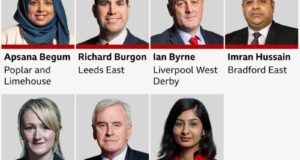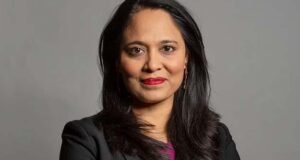 Jeremy Corbyn has avoided a showdown over his support for scrapping Britain’s Trident nuclear weapons at the Labour conference in Brighton.
Jeremy Corbyn has avoided a showdown over his support for scrapping Britain’s Trident nuclear weapons at the Labour conference in Brighton.
The highly anticipated vote had been expected to take place on Wednesday.
But the motion failed to get the support it needed from activists in a ballot selecting the issues to be debated this week in Brighton.
Mr Corbyn will still have to convince his MPs and ministers to back disarmament when Parliament votes.
Some trade unions are against scrapping Trident because it will cost jobs but Mr Corbyn says Britain should ditch its “weapons of mass destruction”.
Labour MPs are “likely” to get a free vote on renewing Trident when Parliament votes on the issue next year.
Mr Corbyn said Labour was an “open and democratic party and the members at conference have decided to discuss the issues that they want to debate this week.
“These are important issues like the NHS, the refugee crisis, mental health and housing.”
Labour MP John Woodcock, who represents Barrow-in-Furness, where the Trident submarines are built, said it was a “sign many Labour supporters want to focus on public not re-run old battles that will split the party”.
The eight issues selected for debate by Labour delegates are: Austerity and public services, employment rights, Europe, housing, the BBC licence fee, mental health, the NHS and the refugee crisis.
Trident is the UK’s sea-based nuclear weapons system – made up of submarines, missiles and warheads – and while the current generation will not begin to end their working lives until some time in the late 2020s, work on a replacement cannot be delayed because of the time it will take to complete.
Image copyrightPA Wire
Mr Corbyn, who is a longstanding anti-nuclear campaigner, said he hoped to do his “persuasive best” to get his deputy Tom Watson and other shadow cabinet members, such as shadow foreign secretary Hilary Benn and shadow justice secretary Lord Falconer, to back him on Trident, but it would not be a “disaster” if there was a difference of opinion.
He said: “We are going to come to an accommodation of some sort.”
Mr Watson, a former defence minister, told BBC Radio 5 Live’s Pienaar’s Politics: “Jeremy says he seeks to persuade us – I seek to persuade him too.”
He added that in “modern politics… you simply cannot have homogeneous positions where 200 people follow a line on everything”.
But former Labour leadership contender Chuka Umunna, who ruled out serving in the shadow cabinet because of differences with Mr Corbyn over issues including Trident, said it was “not plausible for us as an opposition not to have a position on the defence of the realm”.
“I’m all for debate but, ultimately, we are going to have to have settled positions on things if people are to know what it is they are voting for,” he told a fringe meeting.
In other conference developments:
US-owned pharmacy giant Boots hit back at Jeremy Corbyn’s criticism of its corporate tax arrangements saying it was “a significant contributor to the UK economy and pays a significant amount of other applicable taxes”
Jeremy Corbyn named his panel of economic advisers including Nobel Prize winner Joseph Stiglitz and Capital in the 21st Century author Thomas Piketty
Angela Eagle, chair of Labour’s National Policy Forum, told the conference the party was launching a review of how it makes its policies to engage people “more directly”
Labour Deputy Leader Tom Watson told activists at a fringe meeting they were now in an “unequivocal anti-austerity party,” to loud cheers
Unite leader Len McCluskey announced the death of TINA (Margaret Thatcher’s There Is No Alternative economics) and the birth of TIARA (There Is a Real Alternative)
Jeremy Corbyn accused the SNP of saying they are against austerity while pursuing policies which continue it and defended his controversial talks with Irish republicans during the Troubles
Mr Corbyn has vowed to transform Labour into a “big, open democratic” party where policies are openly debated rather than dictated by the leadership.
Image copyrightPA
He detailed the plans to open up the party’s policy-making process to the thousands of new members, many of whom supported the radical left-wing platform on which he stood in the leadership election.
Asked whether “Trotskyists” thrown out during former leader Lord Kinnock’s reforms to the party in the 1980s would now be allowed back in, Mr Corbyn said: “Anyone is welcome to join the Labour Party, providing they support the principles of the party and be content with that.”
He defended shadow chancellor John McDonnell who has said in the past that he supports “insurrection” on the streets for political ends.
He told Andrew Marr Mr McDonnell had used “colourful” language to make a point, adding: “I’m not in favour of violence on the street or insurrection. I believe in doing things by persuasive, democratic means.”
 Weekly Bangla Mirror | Bangla Mirror, Bangladeshi news in UK, bangla mirror news
Weekly Bangla Mirror | Bangla Mirror, Bangladeshi news in UK, bangla mirror news







